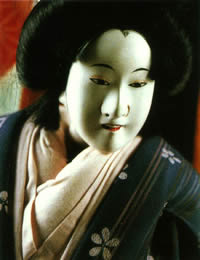

Assignment
2 - Creating a puppet for Storytelling:
Step
1 -Read the background infromation on puppets from around
the world before starting your assignment.
- Bunraku
is a form of Japanese puppetry and storytelling
- the
form goes back about 1,000 years - but became most popular
about 300 years ago
- it
is enjoying a revival today in modern times, but is not
the national passion it once was
- tells
old tales, sometimes stories about history, is very traditional
- often
involves confucian teachings(ie: loyalty over personal
feelings)
- the
artists strive for realism in the puppets
- the
puppets are about a metre tall, may have moveable eyes,
eyebrows and jaws
- may
take three puppeteers to move one puppet
- musicians
played an important role in the play
-
|

Bunraku
Puppet
Source:
"Traditional
Bunraku Puppets"
|
| The
types of theatre listed below are important world theatrical
forms or movements. Research on these topics could form the
basis for a bonus project. |
- Indonesian
Shadow Puppets
are made from flat shapes out of leather or wood
- pieces
are attached to sticks for movement
- the
puppeteer sits in back of a white screen and moves the
puppets to enact the story
- a
lamp throws the shadow of the puppets onto the screen
- the
puppeteer tells the story and speaks the part of each
puppet
|
| Noh
(a form of Japanese theatre) |
| Beijing
Opera
(also called Peking Opera) |
| Brazil's
Theatre of the Oppressed |
Step
2 - Choose a simple story from a culture that is not your
own (perhaps use the story told at the beginning of the lesson).
Step
3 - Create a simple puppet such as a shadow puppet. Use the
puppet to tell the story. You may wish to create groups if it
is a multi-character story (A Webquest on "World
of Puppets" can used to see more information about shadow
puppet construction.).
Step
4 - Perform your puppet play and complete the
self-evaluation.
Return
to Student Lesson / Return
to Teacher Lesson








